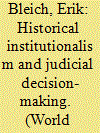| Srl | Item |
| 1 |
ID:
158574


|
|
|
|
|
| Summary/Abstract |
This article integrates insights from different veins of historical institutionalism to offer an analytical framework that specifies how ideas, institutions, and actors account for key aspects of judicial decision-making, including change over time. To the extent that ideas are widely distributed, highly salient, and stable among actors in the judicial field, they can affect patterns of rulings in a particular issue area. The distribution, salience, and stability of norms, however, may change over time for reasons embedded in the institutional structures themselves. Existing policies, laws, or treaties create the potential for new actors to enter the judicial field through processes that theorists of institutional change have identified as intercurrence, displacement, conversion, layering, and drift. New actors can shift the relative salience of ideas already rooted in the judicial field. This ideational salience amplification can alter patterns of judicial decision-making without the fundamental and often costly battles involved in wholesale paradigm change. French high court hate speech decisions provide the context for the development of this framework and serve to illustrate the dynamic. The author uses evidence from an original dataset of every ruling by the French Court of Cassation regarding racist hate speech from 1972 through 2012 to explain the varying propensity of the high court to restrict speech that targets majorities compared to minorities.
|
|
|
|
|
|
|
|
|
|
|
|
|
|
|
|
| 2 |
ID:
169397


|
|
|
|
|
| Summary/Abstract |
Political control is not the only potential source of interference with judicial independence and impartiality. As the stakeholders in cases, litigants have perhaps the most significant incentive to influence the outcome of judges' decision-making. Based on introducing the concept in Chinese society of interpersonal relationships known as guanxi into a discussion of the nature of judicial power, this article examines a report released by the Caijing magazine about 200 corrupt judges convicted between 1995 and 2013 and argues that in China's society with guanxi embedded as its cultural roots, social pressure from relatives, friends and acquaintances of judges is a major source of external interference in judicial decision-making.
|
|
|
|
|
|
|
|
|
|
|
|
|
|
|
|